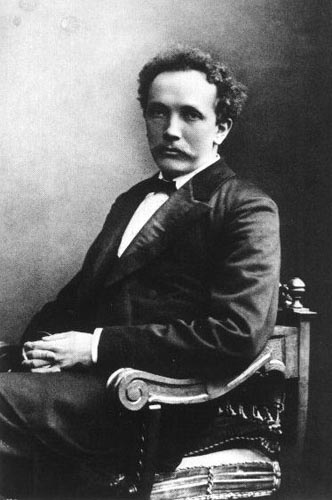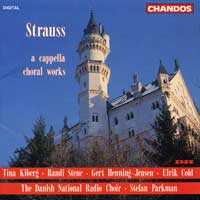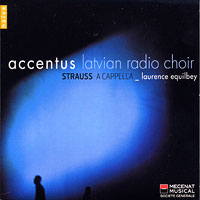In Celebration of the Human Voice - The Essential Musical Instrument
Home | Doo Wop | Barbershop | World | Contemporary | Christian | Vocal Jazz | Choral | Christmas | Instructional | Arrangements
Classical | Opera | Musicals | Personality | Young Singers | Disney | Videos | Songs | The Artists

Richard Strauss

(born June 11, 1864, Munich, Ger. - died Sept. 8, 1949, Garmisch-Partenkirchen) German composer and conductor. Son of a horn player, he began composing at age six. Before he was 20, he had already had major premieres of two symphonies and a violin concerto. In 1885 the conductor of the Meiningen Orchestra, Hans von Bulow, made Strauss his successor. Strongly influenced by the work of Richard Wagner, he began to write programmatic orchestral tone poems, including Don Juan (1889), Till Eulenspiegel's Merry Pranks (1894 - 95), and Also sprach Zarathustra (1896). After 1900 he focused on operas; his third such work, Salome (1903 - 05), was a succes de scandale. Elektra (1906 - 08) marked the beginning of a productive collaboration with the poet Hugo von Hofmannsthal, with whom Strauss wrote his greatest operas, including Der Rosenkavalier (1909 - 10). He remained in Austria through World War II and held a music post in the German government, but he was later cleared of wrongdoing in connection with the Nazi regime. After many years writing lesser works, he produced several remarkable late pieces, including Metamorphosen (1945) and the Four Last Songs (1948). |
Arrangements | Recordings
Recordings and DVDs
Displaying 1-2 of 2 items.
Danish National Radio Choir : R. Strauss: A Cappella Choral Works  The 75 professional singers of the DNRC are directed by Stefan Parkman, who has conducted most of Sweden's symphony orchestras and several excellent choirs. Probably the least-known of Richard Strauss's (1884-1949) major works are his compositions for unaccompanied chorus--not surprisingly, because only the most accomplished choirs are qualified to perform them. When they are performed, however, the rewards are great: 16 part harmony with antiphonal block passages alternating with intricate polyphony. Six pieces: "Der Abend Op. 34 Nr. 1," "Hymne Op. 34 Nr. 2," Deutsche Motette Op. 62," "Die Cottin im Putzzimmer," and "An den Baum Daphne," featuring the Copenhagen Boys' Choir. This is beautiful, fine, intricate stuff, with soaring harmonies and solos. Extensive liner notes with all lyrics and histories. Songlist: Der aben op 34 nr 1, Hymne op 34 nr 2, Deutsche mottette op 62, Die gottin im putzzimmer, An den Baum Daphne Latvian Radio Choir : Accentus - Strauss a cappella Richard Strauss, though better known as a composer of operas and tone poems, wrote significantly in other genres as well. One of those mediums that fascinated him throughout his entire life was the a cappella choral work. The earliest pieces recorded here-the Zwei Gesange - come from 1897, the year of Ein Heldenleben; the latest piece-Traumlicht, the second of the Drei Mannerchore - from 1935-36, those years in which Strauss was occupied with the operas Friedenstag and Daphne. The most extensive work here, and perhaps the most difficult to perform, is the Deutsche Motette. Written in 1913, between his work on the operas Ariadne auf Naxos and Die Frau ohne Schatten, it is a one-movement tone poem for voices. There are moments of incredible difficulty, requiring the basses to perform notes more than two octaves below middle C for passages at a time. The sopranos, on the other hand, are asked to sing passages requiring high Cs, more than two octaves above middle C. The singers here are up to the challenge. This is no small feat for a piece that contains at its highest number 23 individual parts! The earlier Zwei Gesange are also given very fine performances. The ensemble work here is much better in terms of blend. In the beginning of Der Abend (the first of the two Gesange) the singers are very good at overlapping and matching, creating a seamless wall of sound as they transfer from one section to the next. Each entry proceeds smoothly, through the odd chromatic wandering, until the very end when the ensemble creates an almost organ-like sonority. The two remaining pieces are equally thrilling and well done. Songlist: Deutsche Mottette, op 62, Trumlicht, op 123, Zwei Gesange, op 34, Der Abend / Hymne |
![]() Vocal Harmony Arrangements - Home
Vocal Harmony Arrangements - Home
Christian | Gospel | Standards | Musicals | Specialty | World | Barbershop | Contemporary | Vocal Jazz | Choral | Christmas
Mixed Voices | Female | Male | 8 Parts | 6 Parts | 5 Parts | 3 Parts | 2 Parts | Medleys | Solo | Folio Series | New Releases
Select a Category |
Want to Sing? - Find a Chorus Near You
List of Choruses by State | List of Choruses by City


